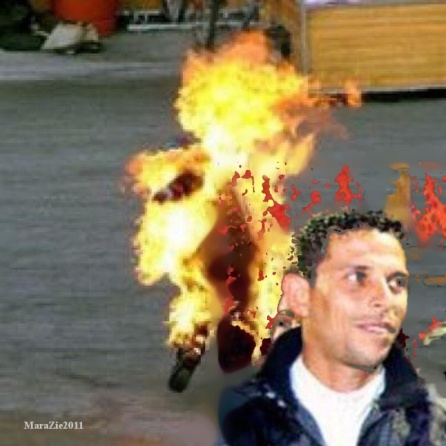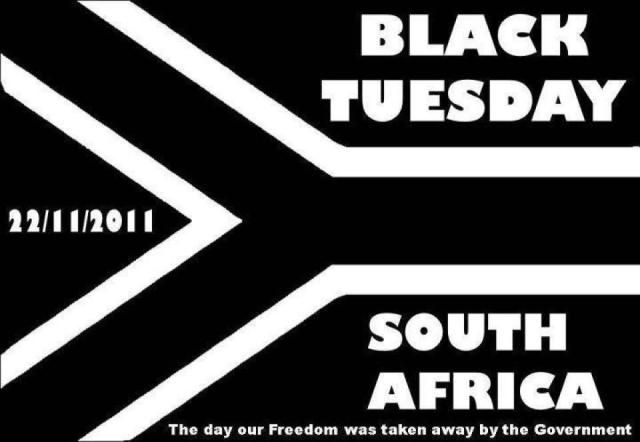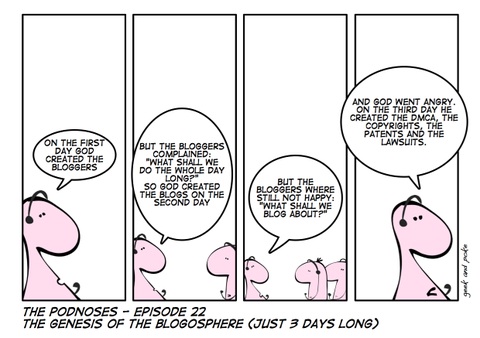VANESSA SMEETS
“When the people fear their government, there is tyranny.
When the government fear the people, there is liberty.”
Thomas Jefferson
Blood Year
A year has passed since the death of a fruit vendor changed dynamics in the Arab world, awakening it to social injustices and finally fighting back decades of dictatorships.
Dozens of seasons under totalitarian rule would be destroyed by the new Arab Spring, but it would be a long and bloody fight that climaxed only a few weeks ago with Gaddhafi’s beaten and bloody body haunting our TV screens.

SELF-SACRIFICE: Mohamed Boauzizi doused himself in petrol almost a year ago, spiraling the Arab world into revolution. PIC: online
“Freedom! Freedom!” the men shout in the background in Arabic. Thousands of angry men march across streets in Tunisia, Libya, Egypt and Syria chanting “ash-shab yurid isqat an-nizam” (People bring down the regime!) over and over again. It was finally time for a REVOLUTION!
Flaming torch of hope
In mid-December, Mohamed Bouazizi, only 26 years old from Tunisia, doused himself with petrol and set himself on fire in the market square. He had just been detained by police for selling fruit on the streets of Sidi Bouzid without a permit. They then humiliated and beat him.
His burning body went viral on Facebook, in protest of police corruption and ill treatment by Tunisian dictator Zine El Abidine Ben Ali and his wife, in power for 23 years and responsible for high unemployment, censored press, rising food prices and corruption. People took to the streets, baguettes in hand, chanting: “Bring him down! Bring her down!” It was very reminiscent of Bastille Day during the French Revolution. Bouazizi died a few weeks later from his burns, spiraling demonstrations by young people all over the country.

RIGHTFUL CAUSE: Bouazizi's death led to demonstrations all over the world fighting for Arab rights. PIC: Online
Wikileaks unleashes fury
The extreme act of self-sacrifice sent shockwaves throughout the Arab world, which culminated with Wikileaks disclosing information on how corrupt the government really was, under the document labelled “Diplomatic Cables.” The ousting of Ben Ali gave hope to millions of other Arabs to gather enough courage to demonstrate and take part in a Coup d’Etat and finally get rid of their own dictators.
The Arab Spring marked the beginning of the end for dictatorships all over North Africa. The governments in Egypt, Tunisia and Libya were overthrown, with all family members fearing for their lives. Only last week, the last surviving son of Gaddhafi (Saif) was captured. All his brothers and most of their children were tortured then killed.

VICTIM: Beautiful Lara Logan was an innocent victim in the Arab spring riots in Egypt. She was sexually assaulted and left to die. PIC: Online
Arabs around the world united for a common cause: FREEDOM from fear, oppression and censorship. The protests in Egypt started 25 January 2011 and lasted for weeks. But, they were given proper international attention when South African CBS reporter Lara Logan was sexually harassed while covering the protests. A pretty petite blonde, she describes the event as:
“They were like a pack of hounds hungry for change, possessed by a common cause. I unfortunately got dragged in the crowd, my clothes torn to shreds and my body molested by fingers and sticks. I was convinced I was going to die, until I fell into the arms of a group of Arabic women sitting alongside the crowd. They screamed for the men to get away from me. That’s when they realized they had to get back to their main aim of protesting for freedom.”
Her interview can be viewed on: http://www.youtube.com/watch?v=bO12X1nhzzk
Reporters described such behaviour as: “When men lose everything and have nothing left to lose, they lose it!”
Common cause
Arabs were also fighting for their “brothers and sisters” oppressed by other governments, such as Palestine. On 23 September 2011, a bid was sent to United Nations demanding Palestinian independence and statehood. Schools and government offices all over Israel shut down as demonstrations began.
It is also believed the Occupy Wall Street movement later this year was influenced by the Arab Spring. Millions of strangers were fighting for the end of corporate and elite power and demanding global social justice, placards reading: “Are you ready for a Tahrir movement?”
The crowd, eyes filled with hatred, scream:
“It does not matter whether you are Christian, Muslim or Atheist, you shall demand your G*d-damn rights! We will never be silenced!”
The future of the Arab world will be determined by the main idea: “Live for something or die for nothing!”

ANARCHY: Will the Arabic Revolution have enough momentum to stir the rest of the world to social injustices? PIC: Online
Will oppressive governments in the rest of Africa and even the rest of the world, like the Democratic Republic of Congo, Zimbabwe, North Korea and China, be as easily toppled? Only if such a new level of consciousness is achieved. Citizens must gather as much force and determination as those who fought hard to free themselves from human rights’ violations. As the Islamic crescent sets on fields of blood and sweat, a new dawn for the rest of the world is on the horizon…
A daunting question is left to be answered: will the world itself ever be able to…

Interesting cartoon by South African cartoonist Jerm:
http://mynameisjerm.com/africa-2-0-installing-democracy/
Photos on Bouazizi and his family members: http://photoblog.msnbc.msn.com/_news/2011/01/28/5941280-mohamed-bouazizi-the-fruit-vendor-whose-death-may-have-changed-the-arab-world









